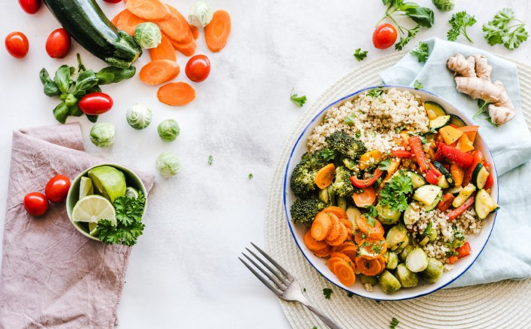Three useful tips for SugarSmart sustainability

The increased focus on sustainability is useful to protect our fantastic planet! When it comes to protecting the environment, one of the focus areas is the way we get the proteins for our everyday lives.
You might ask yourself ‘how do we get the proteins if we cut down on meat and how can it be sustainable to ship lentils and chickpeas from one continent to another?’
I will not go into the climate debate but only provide some useful tips.
Below I have compiled my three recommendations for you if you want to live SugarSmart and do not want to be cheated, when you buy food.
Tip 1: Eat plants – not meat substitutes
If you want to live sustainably SugarSmart, then navigate around the meat substitutes, e.g. ‘plant fresh’, ‘mushroom steaks’, ‘plant sausages’ etc.
The nutritional composition of fat, protein and carbohydrate may seem reasonable. However, you can almost be sure that these are fully processed foods, often added sugar, starch and all kinds of e-numbers. In my opinion, they do not belong to a sustainable or SugarSmart diet, nor do they have a positive effect on your gut microbiota. Therefore, replace the ‘meat substitutes’ with proper non-processed food to cover your protein needs.
Tip 2: Never throw away – but use leftovers and supplements Whether you have protein and fat sources, vegetables or cabbage left over from yesterday’s main meal, don’t ever throw them away. Be sure to use them for your meal tomorrow. If you have leftovers from protein sources (such as omelet, a lentil steak, a piece of meat or fish), then cut some cabbage, add some of the season’s tasty vegetables and spice up the leftovers with nuts, seeds and fresh herbs.
If you have leftover vegetables or cabbage salad, you can add a couple of boiled eggs, a delicious humus or some of your favorite nuts or seeds. It is a good idea to always have eggs, cabbage, seeds, almonds, nuts, and the like in the fridge. Then you always have the opportunity to turn your leftovers into beautiful morning, lunch, or dinner meal. And maybe you should consider, whether your really have to eat differently in the morning, at noon and in the evening.
Tip 3: Know your protein sources Adults need to eat 0,03-0,05 oz of protein per 2 pounds of body weight. That is, 2,5-3,5 oz protein pr. day if your weigh is 154 pounds and 3,5-5,2 oz pr. day if you weigh is 220 pounds. If you do not eat big steaks, it is a good idea to do the math to find out how much protein you need. Below I will show you some examples and you will see how much protein you will find in selected foods contain pr. 3,5 oz (100 grams) of food:
Beef tenderloin: 0,7 oz (20 grams)
Whole grilled chicken: 0,85 oz (24 grams)
Hot smoked salmon, 0,84 oz (23 grams)
Tuna in oil or water: 0,87 oz (25 grams)
Red lentils: 0,95 oz (27 grams)
White beans, dried: 0,74 oz (21 grams)
Chickpeas, dried: 0,70 oz (20 grams)
Tofu: 0,25 oz (7 grams)
Almonds: 0,87 oz (25 grams)
Peanuts: 0,87 oz (25 grams)
Hazelnut: 0,45 oz (13 grams)
Flaxseed: 0,87 oz (25 grams)
Sesame seeds: 0,70 oz (20 grams)
Chia seeds: 0,74 oz (21 grams)
Cauliflower: 0,07 oz (2 grams)
Broccoli: 0,1 oz (3 grams)
Green beans: 0,07 oz (2 grams)
Fresh peas: 0,2 oz (6 grams)
Avocado: 0,07 oz (2 grams)
Cheese: 45+, 0,87 oz (25 grams)
Cabbage is you best way to benefit from the fantastic biological effects of your foods, but it is not a good source of protein.
The Internet provides you with different tables where you can see the amount of protein in different food sources. It is really good to know, regardless if your goal is to just cut down on your daily meat consumption, to eliminate a few meat meals each week or maybe even want to live completely vegetarian or vegan.
Do you want to know more about how to live SugarSmart?
Do you want to know more about how you can organize your diets and lifestyle in a SugarSmart way? Then I will recommend you to read my book The truth about sugar